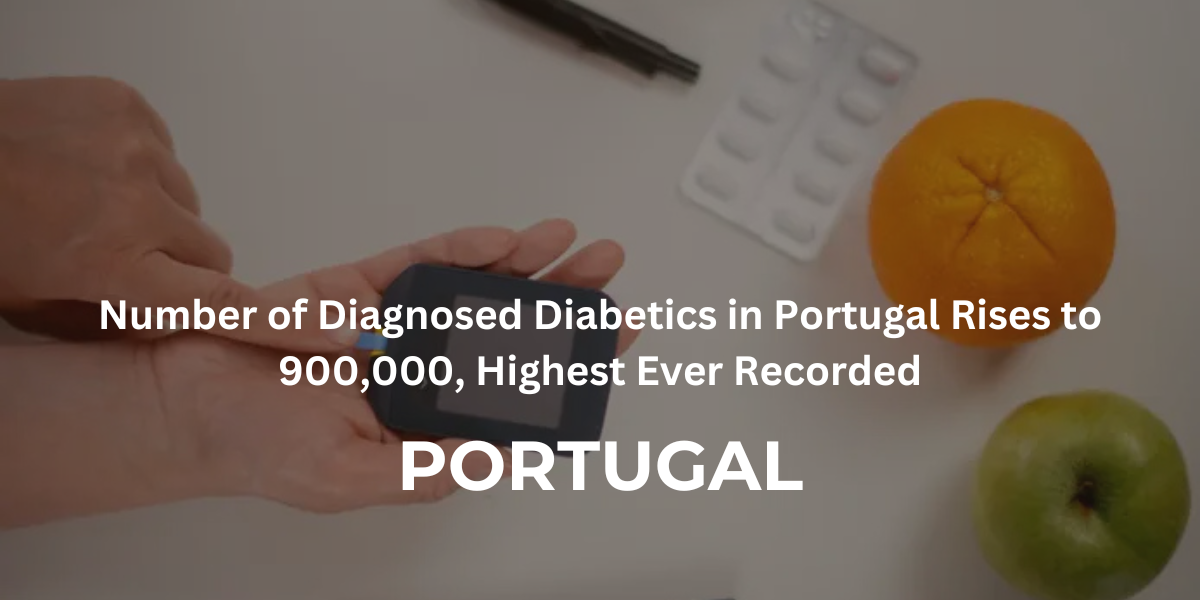In 2023 about 75,000 people were diagnosed with diabetes pushing the total number of registered diabetics in primary health care to over 900,000—Portugal’s highest recorded figure to date.
The 2024 report of the National Diabetes Program (PND) from the Directorate-General for Health DGS includes this data. Scheduled for presentation this Thursday, the report indicates that 75,661 new cases of diabetes were diagnosed in mainland Portugal in 2023.
Read More About: 117 Video Surveillance Cameras Will Be Installed In Porto By April 2025
Rising Prevalence And Health Impacts

“In Portugal in December 2023 more than 900,000 people were registered with a diagnosis of diabetes in primary health care corresponding to around 8.6% of the total number of users registered with the National Health Service (SNS) the highest figure ever.”
The Directorate-General for Health (DGS) warns that the rising trend observed in recent years persists estimating that with the high number of undiagnosed cases over one million Portuguese may have diabetes.
The director of the National Diabetes Program (PND) told Lusa that:
“What is worrying is that we have many people identified many people at risk and this suggests that in the coming years these numbers will possibly continue to increase.”
Economic And Healthcare Burden
The disease carries very high costs with an estimated 12% of the health budget linked to diabetes said Sonia do Vale. She emphasized that in Portugal there is still a need to invest in prevention as preventing the disease is more cost-effective than treating it.
The document noted that total spending on antidiabetics stabilized in 2023 reaching 493 million euros compared to 494 million euros in 2022 following significant increases in prior years.
The report also shows that in 2022 there were 254,516 hospital admissions for people with diabetes where the disease was the primary diagnosis in 21.1% of cases. The average hospital stay for these patients was ten days exceeding the NHS general average of 8.6 days.
Diabetes-Related Mortality And Complications
The report further warns that:
“In 2022 diabetes was responsible for 2,838 potential years of life lost under the age of 70 with an average of 8.1 years of life lost for each death occurring under that age.”
In that year diabetes was responsible for 3,727 deaths corresponding to 3% of deaths in Portugal of which 9.4% occurred in people under the age of 70.
Screening And Prevention Efforts
According to the document new cases of diabetes registered in 2023 had high coverage in terms of access to healthcare including medical and nursing surveillance. It is also estimated that between 35,000 and 40,000 people in Portugal have 1st type of diabetes.

In 2021 and 2023 primary healthcare identified approximately 3.4 million users with at least one risk assessment for 2nd type of diabetes representing 55% of the target population. Of these more than one million (31.9%) were classified as being at moderate high or very high risk.
Sonia do Vale said:
“If we could prevent obesity, we would prevent most cases of diabetes.”
These figures also indicate that more than half of the target population is screened highlighted the director of the PND who listed obesity a sedentary lifestyle and the aging population as key factors contributing to the high prevalence of the disease in Portugal.
Future Plans For Diabetes Prevention And Management
Regarding screening for diabetes complications 2023 saw a return to pre-pandemic levels. However, for diabetic retinopathy the population coverage rate did not exceed 51%, and the screening rate was just 32%.
For the period 2025-2027 the PND proposes an action plan aimed at reducing the development of diabetes in at-risk individuals increasing the number of early diagnoses and decreasing morbidity and mortality associated with the disease.
Sónia do Vale said that:
“A prevention program based on primary health care had been outlined but defended the need to take the leap to also involve the community and local authorities in order to support diabetes prevention and control programs.”
PND director said that:
“Primary health care is very important and therefore it was important to strengthen the teams and the idea that therapeutic education is part of the units’ activities.”
Also Read: Portugal Motorway Tolls Expected To Increase By 2.21% In 2025
